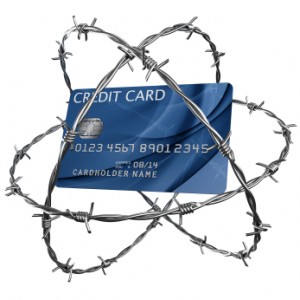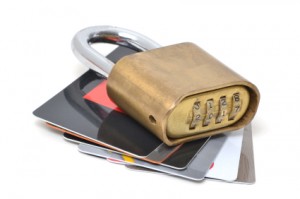 With more and more being broadcast about identity theft scams involving credit cards, people are becoming increasingly leery of using their cards to pay for purchases, especially online. There are several steps you can take to reduce the chance that you will become a victim of one of these scams.
With more and more being broadcast about identity theft scams involving credit cards, people are becoming increasingly leery of using their cards to pay for purchases, especially online. There are several steps you can take to reduce the chance that you will become a victim of one of these scams.
Find credit card companies that offer a high level of protection to their consumers with our FREE credit card finder now!
From shopping on sites that require security codes and passwords to knowing how to handle lost or stolen credit cards, you can take control away from those who are out to scam you.
How do credit card scams work?
The Federal Trade Commission, reports that the most common ways in which credit card fraud occurs include:
- Cards lost or stolen
- Dishonest individuals steal credit card information online, via the phone, or elsewhere
- Mail with personal information is stolen
- Credit cards are copied by dishonest business employees
 Two types of common credit card fraud schemes are known as skimming and phishing. Credit card skimming is the term used to describe scams when business employees, for example restaurant wait staff, make an illegal copy of your credit card using a machine called a skimmer. This information is either used illegally or sold to others who typically create counterfeit cards using legitimate names and credit card numbers.
Two types of common credit card fraud schemes are known as skimming and phishing. Credit card skimming is the term used to describe scams when business employees, for example restaurant wait staff, make an illegal copy of your credit card using a machine called a skimmer. This information is either used illegally or sold to others who typically create counterfeit cards using legitimate names and credit card numbers.
A second common scam is known as phishing. Phishing occurs online when deceptive emails made to look like they are from a legitimate bank, online site, or other financial institution are sent out asking for your credit card information. If you respond to this email, you may have unknowingly handed your personal information over to a crook.
What are some ways to protect yourself from these credit card scams?
With the many scams that criminals have developed to obtain your credit card information, you may be tempted to never use a credit card again. You do not have to resort to this! Instead, there are several simple steps you can take to make sure you are not the victim of an identity theft scam involving your credit card. These steps include:
- When you use your credit cards online at sites that store information, make sure you change your user names and passwords frequently. Also, do not use passwords that can be easily guessed such as variations of your name, your children’s names, your phone number, etc. Do not use the auto fill option many computers offer for user names and passwords.
- Try to shop at online sites that require you to enter your credit card CID code. This is the three-digit number on the back of your card. If your card number has been stolen, chances are good that the criminal will not have the security code unless they have possession of the actual card.
- When you activate your credit card for the first time, call from your home phone and sign the back of the card as soon as you receive it. Record all credit card information and store it in a secure place away from your purse or wallet.
- Always check your billing statement and try to check statements more frequently by accessing your account online.
- Keep your purse and/or wallet secure at all times and consider keeping your credit cards in a separate cardholder and not in your wallet.
- If your card does turn up missing, contact your credit card company immediately.
- In order to help prevent mail fraud, change your address with your bank and credit card companies immediately upon moving.
- When you receive credit card offers in the mail that you choose not to apply for, shred all forms that contain your name.
If you are contacted via phone and asked for your credit card number, do not give it out unless you can prove the person you are speaking to is who they claim to be.
Your bank or other companies will never ask for your credit card information via email because it is not secure. Never respond to emails asking for this information. Instead, simply delete suspicious emails without opening them.
What happens if you do become the victim of a credit card scam?
The good news is that if you do become the victim of a credit card scam, you are protected through the Zero Liability clause of the Fair Credit Reporting Act. This protects consumers in preventing them from being held accountable for fraudulent credit card charges. For more information on this act, you can visit, MyMoney.gov.
Do not let yourself become another identity theft victim via a credit card scam. Use the above techniques to protect yourself and your credit card information from those who may be out to take advantage of you. While the Fair Credit Reporting Act now frees you from liability if your credit card information is stolen, it can still become a major hassle if you have to cancel your credit card and prove to the credit bureaus that charges are not yours.
Use our FREE credit card chaser tool to find the credit cards from companies that offer added consumer protection!








